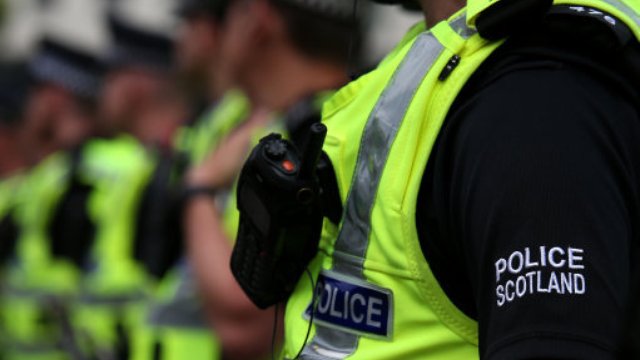Hundreds more officers to get Tasers
14 December 2017, 16:00

An extra 500 officers will be trained to use Tasers to improve safety for the police and public, Police Scotland has announced.
The move is driven by an increase in the number of assaults on officers on duty, from 764 in 2016 to 969 so far in 2017, Police Scotland said.
Officers trained to use the Taser X2 will be deployed in all 13 divisions across Scotland, with training due to start in May 2018.
Police also announced that they would extend the role of Armed Response Vehicle (ARV) officers to allow them to be deployed to more non-firearms calls.
Deputy Chief Constable Johnny Gwynne, said increasing the use of Tasers would improve safety.
Announcing the move at the Police Scotland College at Tulliallan, he said: "The number of officer assaults is growing, how can we protect our teams better?
"We've seen an increase in the number of assaults on officers and bladed weapons being used, enough to make us concerned we need to ensure the protection of our front-line teams and also protect the public.
"We can do this better with Taser which gives us a very safe alternative to firearms to deal with these threats."
Currently, only firearms officers are authorised to use Tasers but the newly trained officers will be part of normal shifts.
He said: "Those who volunteer for the training are already part of shifts across the country, from Ullapool to Dumfries, and they will continue to perform their normal duties but will have Taser capability."
Police said the Taser allows officers to maintain a safer distance from the threat, giving the opportunity to prevent the incident from escalating and the hope of a quicker and safer resolution.
The 500 specially trained officers (STOs) are expected to be operational by August next year.
In March there were calls for all officers to be equipped with Tasers and an increase in the number of armed officers at the Scottish Police Federation annual conference.
DCC Gwynne said the Taser training was not in response to any terrorist threat but that it could provide an extra layer of security before firearms officers can reach the scene.
He said: "Of course there will be a use of a terrorist threat presents in front of them and they feel able to deal with it."
Every time a Taser is discharged a report is sent to the Police Investigations and Review Commissioner to independently assess the incident.
Changes to the way firearms officers are deployed will come into effect early in the New Year.
Currently they respond to incidents involving firearms or threat to life, or anything they come across during their patrols.
The changes mean they can be deployed to incidents where speed of response or vulnerability is an issue, and an ARV officer is closest to the scene.
DCC Gwynne said this would enable them to use their core policing and advanced emergency first aid skills to assist at incidents such as road crashes or medical emergencies.
The deployment of the ARV officers will be overseen by specially-trained inspectors in the control rooms who can pull them away if need be.
They may be able to deal with quick incidents themselves but if an incident is likely to last a long time it is expected that ARV officers will "hold the fort" until other officers arrive.
The moves will be presented to the Scottish Police Authority Board on Tuesday.







